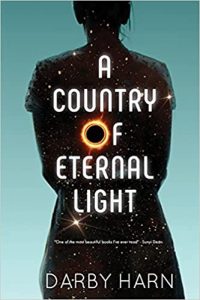Black Hole Apocalypse
 Genre: Science fiction, apocalypse
Genre: Science fiction, apocalypse
Positives: Stunning prose. Emotional depth.
Negatives: A happy ending isn’t really an option, given the scenario. Difficult main character.
Mairead, traumatized by the loss of her child, her mother’s rapidly progressing dementia, and her father’s relatively recent death is withdrawn and suicidal. And now, a black hole wanders closer to Earth swallowing everything in its path.
At in the novel, I was reminded of the movie Melancholia, in which a rough planet is on course to smash into Earth. And the main character, an acutely depressed basket case, weathers the planetary collision with greater composure than her ‘together’ relatives.
But the analogy to Melancholia ends when an affair and unexpected pregnancy retether Mainread to life. And despite the increasingly dire situation, she clings like a leach to hope.
Mainread is a difficult character. In the first quarter of the book, she wallows in grief, easy to understand, but a bit difficult for the reader to withstand. And she is the architect of much of her own sorrow. Who trots off to work in an aged care home on the eave of an apocalypse, her home surrounded by heaving flood waters, and leaving her young child in the care of a demented woman? And in the second half of the book, she wallows to a degree in hope, her actions often inexplicable in the absence of a future. However, the author conveys Mainread’s inner world with truth and consistency. So though she’s a mess, she’s believable.
Be forewarned that A Country of Eternal Light is not a happy read. I can’t recommend this book for those who’ve recently suffered a loss, in particular, the loss of a child. Those seeking post-apocalyptic tale of survival might also be disappointed. This novel is less about the mechanics of survival than human reactions to tremendous loss including proceeding with business as usual, hoarding resources, despair, and hope beyond reason.
However, this author has a keen sense of both the natural world and the human soul. He conveys his observations with strong, lyrical prose conveying a remote Irish island’s harsh beauty and the emotional devastation wrought by the approaching end, a resplendent darkness.
Sanderlings skirt across the exposed beach, pecking for food. The tide rolls in and they sweep up the shore, each one a cursor speeding across a blank page.
Finding grace is us finding our better selves. Asking the question. Accepting the silence.
